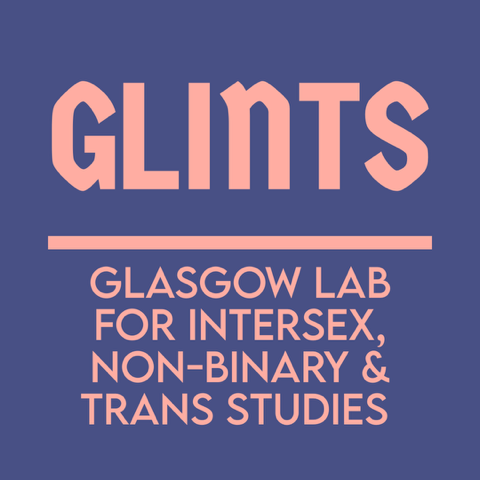GLINTS: Glasgow Lab for Intersex, Non-Binary and Trans Studies
Glasgow Lab for Intersex, Non-Binary and Trans Studies (GLINTS) provides a multi-disciplinary, cross-College space for nurturing the research of academics and research students working in trans studies, broadly conceived.
Trans studies is an established interdisciplinary field that includes (but is not limited to) enquiries into: the meaning of gender as a socially constructed, relational, and historically contingent category; the lives and experiences of people in the past and present who live in some way at odds with the gender they were assigned at birth; strategies for addressing the oppression that intersex, non-binary, and trans people have faced and continue to face; and creative practice that responds either to abstract conceptualisations of the meaning of gender or to trans lived experience.
Our current members engage with research and teaching in this field from disciplinary perspectives that include Classics, Creative Writing, Community Development, Economic and Social History, Education, Geography, History, Media and Cultural Studies, Philosophy, Planning, Insight and Analytics, Public Health, and Sociology.
We are committed to interrogating, understanding, and improving the social, political, and material conditions that shape intersex, non-binary, and trans lives, in an academic environment that respects and affirms intersex, non-binary, and trans people.
Co-directors
Sasha de Buyl (School of Critical Studies — Creative Writing)
Kirstie Ken English (School of Social & Political Sciences — Sociology)
Adnan Hossain (School of Social & Political Sciences — Sociology)
Harvey Humphrey (School of Social & Political Sciences — Media and Cultural Studies)
Katharine Jenkins (School of Humanities — Philosophy)
Ruth Pearce (School of Education — Community Development)
Isabel Ruffell (School of Humanities — Classics)
Sam Rutherford (School of Humanities — History)
Antonio Ivan Sánchez Hervás (School of Social & Political Sciences — Economic & Social History)
Jay Todd (School of Geographical and Earth Sciences — Geography)
Events 2025–26
GLINTS Launch Event
21 October, 4–5.30pm — Register here
Trans Learning Partnership:
Stronger Voices Report Launch & Applied Trans Studies: Research for Practice
31 October, 10am–4pm, ARC — Register here & here
Check back soon for more details of upcoming events!
Contact us
GLINTS welcomes new members who are University of Glasgow affiliates who conduct research in the field of trans studies, broadly conceived. Other researchers, students, and community members in Glasgow and beyond are welcome to attend our events and join our mailing list. For more information, please feel free to contact us by email.
Statement of Values
The purpose of the Glasgow Lab for Intersex, Non-binary and Trans Studies is to provide a multidisciplinary, cross-college forum for academics and research students working on research topics and teaching related to trans studies, broadly conceived. We focus on interrogating, understanding, and improving the social, political, and material conditions that shape intersex, non-binary and trans lives in an academic environment that respects and affirms intersex, non-binary, trans and gender-diverse people.
Members of the Trans Studies Network agree that:
- We abide by the University of Glasgow’s Code of Professional Conduct and Equality and Diversity Policies, particularly with regard to Appendix E of the University of Glasgow Equality and Diversity Policy which covers trans inclusion and the protected characteristic of ‘gender reassignment’.
- We create and participate in spaces, discussions, and collaborations that are inclusive of intersex, non-binary, trans and gender diverse people, supporting the right of individuals to define their own gender and to be respected accordingly.
- Through our research and/or teaching, we seek to advance understandings of the full diversity of intersex, non-binary, trans and gender-diverse people’s lives and/or improve their lived conditions, centring their voices and experiences, without questioning the legitimacy of their lives, rights, and gendered realities.


